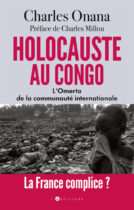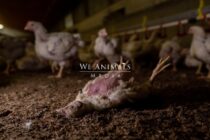Last month, during a weekend stay in Paris, I stumbled upon this particular image in the subway, prominently displayed on an ad promoting the book. The title, of course, immediately drew my attention. „Holocaust in the Congo“ provokes a strong sentiment about the topic, and coupled with a distressful photo, it immediately tells a story of a horrific tragedy. Now, I have no reason to doubt that a holocaust has indeed happened in this place, and it‘s clear why the author chose the word „holocaust“ for the title: to somehow give a name to the immensity of suffering of the people in which France was probably an accomplice (pointed at by the subtitle „La France complice?“). What I do want to point to is linguistic hypocrisy as another example of overall speciesism, which is present in all areas of our everyday life, including language and communication.
The question is: why is it alright to use the word „holocaust“ in this particular example (and others that describe human suffering) but not when we want to describe the unbelievable suffering of literally trillions of non-human animals every year – innocent, sentient beings who are enslaved, experimented on, abused, tortured, raped, mutilated and violently murdered? The immensity of their suffering cannot even be put into words, which is why the most powerful word, a word that has the most intense emotional connotation and a word that encompasses all the different horrifying things that humans do to their victims is precisely a „holocaust“. Many Jewish writers have themselves written about this.
We are all well aware that the Holocaust happened to the Jewish people during World War II at the hands of the Nazis. That doesn‘t mean that another holocaust cannot happen, and indeed, that it is not happening right now (which it is). In short, to attempt to ban the use of the most descriptive word known to mankind for non-human animals under the pretext of sensitivity, but to allow the same word to be used for human animals for the same suffering is a clear example of linguistic speciesism, that is, a discrimination in our language against other sentient beings based on their species.
Until we learn to respect others‘ rights and behave according to the moral baseline, regardless of the species, race, and other differences, we will continue to subject both human and non-human animals – to other holocausts.
Tag: veganske vinjete
VEGAN VIGNETTES: WORDS AND MEANING
In my last post (and also the first official Vegan Vignette), I used the term „vegans” seen through a diet, in the sense of an animal-free plant-based diet, and to an extent, a whole-foods, animal-free plant-based diet to support the argument which I elaborated on there. However, I didn’t refer to it as “plant-based” and in that sense, it would seem that veganism is “just” a diet. I’d like to clarify something here: Veganism is NOT simply an abstinence from meat, dairy, eggs and other animal „products“. It is an ethical stance against animal abuse, mutilation, rape and slaughter of trillions upon trillions of animals around the globe. That includes experimentation on animals, hunting, circuses, bullfighting, horse riding, and all other aspects of human activities that include animals apart from saving and taking care of them without wanting anything in return, and leaving them alone. Animals are not here for us, but with us, and have the same rights as we do.
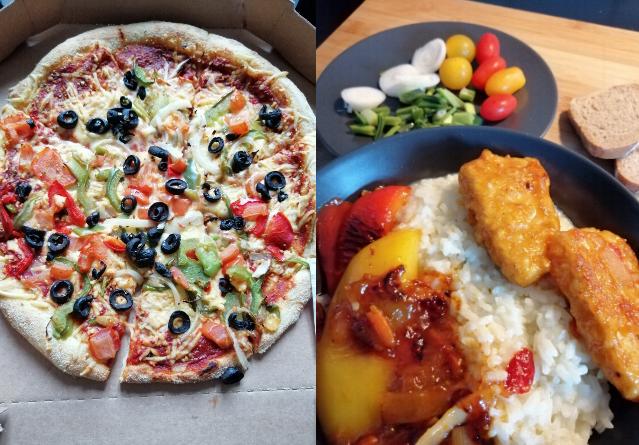
/Vegan orders & homemade meals/
However, the animal abuse spin machine has certainly been trying hard to hijack the term „plant-based“ to dillute it and make the message seem less clear. This is true for all countries, regardless of their level of development. Part of the success relies on the innate lack of clarity of the term. In countries like my native land of Bosnia and Herzegovina, the term „plant-based“ is usually translated as „bazirano na biljkama“ or „biljna prehrana“ (plant diet), but the term „based“ or „bazirano“ is in itself non-exclusive to other things and actually implies simply a foundation, upon which it is not unusual or it’s even expected to have something else in it.
The same can be said for English and other languages. In Cambridge Dictionary, the term “plant-based” is defined as the following: “consisting or made completely of plants, or mainly of plants“. Rule vs usage? Not really in this case. Take for example the phrase „based on a true story“ at the beginning of many famous Hollywood films. Does it mean the film is the truth, the only truth and nothing but the truth of what happened? Not at all. The linguistic foundation of this term is faulty because it can be understood in terms of percentages, and that’s not what an ethical stance is. For example, you cannot say that child well-being is also good even if it’s partial, meaning, say, abusing a child just in the evening, instead of the whole day. Due to this muddleness*, it can be perceived that a lot of other, animal „products“ can be seen as acceptable and as such easily added into a „plant-based“ meal. In addition, words like „mostly“ and „predominantly“ are being thrown around a lot around this term, and I don’t think it’s doing any good in terms of clarity of the anti-speciest message. This lack is easily used by non-vegans to try to undermine the tenets of veganism.
In highly developed countries, the animal abuse lobby efforts go along the same lines. The food giant Tyson even had a „plant-based“ range that was advertised to all people (read: vegans) receptive to the message, but wasn’t vegan at all! Fellow vegans, we know that a title means nothing, because we still need to check the label for ingredients. Certain sources (here, here and here, among others) make a clear distinction between a vegan and a plant-based diet, and my guess is that this dillution of the term is additionally supported by medical texts that view a plant-based diet along the same lines as the paragraph above. There are many of them out there, and for most medical researchers, the term „vegan diet“ is the only one understood in ethical terms. We’ve seen a heightened interest of mainstream audience in the health consequences of a classic diet, rising exponentially after the influential WHO report on processed meat and red meat as carcinogens, and the spillage of confusing terminology and dillution of the vegan message in terms of “plant-based” probably began globally at the same time. This was also around the same time that I started understanding the difference between the term „plant-based“ and “vegan”, because unfortunately, the first was being perceived and deliberately used incorrectly more and more by people and companies unperturbed by ethics. As a linguist, I am constantly trying to analyze my linguistic output to be as clear as possible and correct, in particular with animal rights activism, and this is no different. We need to be aware of this.
That being said, I understand the concerns about conflating veganism with just a diet. However, it is certainly the biggest fight and the threshold of veganism, because, for many other forms of abuse, mutilation, torture and slaughter, there are far less people supporting it (take for example, the issue of bullfighting, or eating dogs and cats in certain parts of Asia – there are many people in the Western world who are actively against it, while still not being vegans themselves). The definition of a correct, ethical diet should therefore be undeniably clear. Perhaps we could reinforce the term “plant-based” with the adjective „anti-speciest“? “Completely”? We will see. What is certain, however, is that what we put into our bodies needs to be completely animal-free, because that is the only right thing to do. Animals are sentient beings and it is morally and ethically wrong to do anything to them that causes pain, suffering, anguish, disease, and unease. Go vegan – and be on the right side of history.
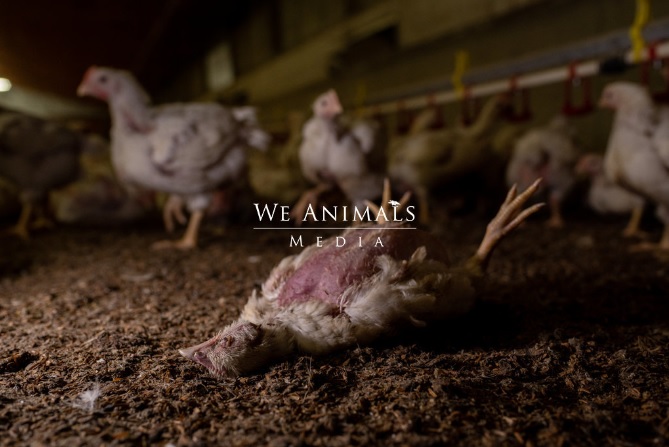
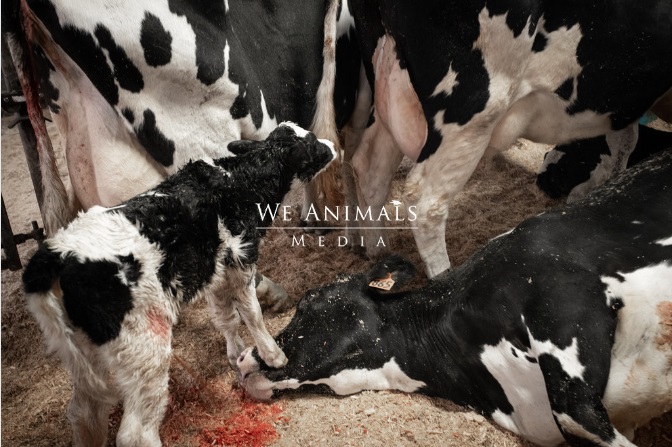
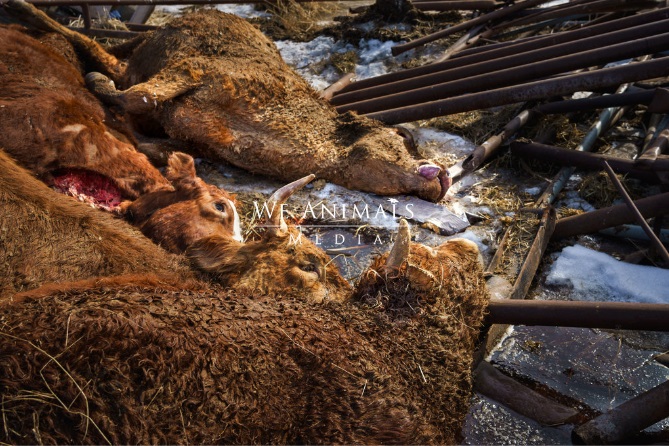
/Images courtesy of WeAnimalsMedia.org from various farms/
*We see deliberate efforts in sowing confusion in other areas – for example, we have to pay attention to the terms „vegan“ and „cruelty-free“ in cosmetic and sanitary products, because, even though logic dictates they are the same, the first means „no animal substances“ and the second „not tested on animals“.
VEGAN VIGNETTES: YOUR LIFE
I was talking with my husband earlier tonight and upon touching the inevitable topic of vegan meals during holidays with one’s family, I finally articulated something that has been swimming in my thoughts for some time now. A thought that is both of spiritual and compassionate nature.
When you have children, it’s sort of usual to expect that you will be there for them until an old age, so we feel that our physical fitness for longevity is pretty much given (even though it, of course, isn’t). But, when it comes to grandparents, we don’t have the same expectation because we have been inclined to think, and it has been culturally imprinted on us, that their health is something that we can’t really negotiate, and that whatever years they have with their grandkids, our offspring, are just like a gift. High blood pressure creeps in. First heart attacks start to appear (I’ve put it in plural if one is lucky enough to live through the very first one); a stroke might be mild but still impairs you. Obesity, high cholesterol levels, diabetes type 2, arthritis, back pain, cancer. A plethora of things that are caused by food and stress. Genetics don’t play that big of a role as society would like us to think – it only accounts for about 5 to 10% of your overall health inclinations. But when you give up your ability to decide and just shrug thinking „I can’t fight with issues I inherited“, you basically just continue living the way you got used to, placing your fate below your taste buds and habits – turning you into a perfect victim for, well, mainstream consumerism. A voluntary victim. In addition to that, aren’t bad genetics, even if it actually had possessed a major influence on your life, precisely the reason why you should take your health into your own hands? Fight the DNA and let the bad genes starve? For example, women who inherit the BRCA gene for breast cancer should be especially mindful of what they put into their bodies, right? Sort of like putting that new-age proverb about the wolf you feed in the food and health context.
But, that’s not even what I wanted to say here. The crux of the matter is this: when you continue to eat animals, sentient individuals who are capable of a variety of emotions just like us, and who never want to be violently slaughtered, you deny yourself the opportunity to not only truly marvel at the longevity that our bodies can give us, but you also deny your loved ones of the thousands of hours you could have spent together. Enjoying a wonderful plant-based meal on a Sunday with your kids, grandkids and their kids, friends, neighbors, a kind stranger. A house full of love for decades which lights up magnificently on holidays. Teaching your granddaughter how to be harness her woman power in life. Giving your grandson a first lesson in cooking. Being there on their graduation days, basking in pride and love for your line continuing well beyond what you can imagine. The impact that they will have in the world, and you actually being there to see it, fully capable and vital in your body. Their first award speech when they mention you. Dancing on their wedding day. Feeling the affection, attention and care from them when your life starts to become slower and more contemplative. Entering your ninth or tenth decade with a smile and a birthday cake that your grand-grandkid just put his little hand on and snatched that candle from the top. You deny yourself your immortality.
For what is living if not leaving something of yourself vividly in the memories and life your loved ones create with you? You could go on and on as that wise grandparent who took the advice, went vegan, and lived to see the family for generations ahead. The one who stopped being a bystander and did everything you could to be there to support those who matter to you the most. For those who need you in their life. That is your responsibility. Isn’t it utterly absurd and downright immoral of you to deny them your experiences, your wisdom, care and love? Do you really want to die before you even set eyes on your first grandkid? Hell, for some, even your own kid? Or your sister’s kid? Your best friend’s child with those big soft eyes just begging you to tell them you love them the most? Doesn’t it hurt when your disease puts you in a hospital bed and, instead of love and joy, you give your loved ones grief and suffering? Simply by ingesting the grief and suffering of animals? Doesn’t that cycle have to end?

Your deny yourself your immortality. For the trees you plant, the leaves you give sunrays to, the flowers that bloom only in your presence are more important than what you eat now. You live forever through them. Your essence is never lost when you leave your family, your art, all your creations on this Earth after doing all that your spirit was intended to do, in its totality.
I urge you to give your life true meaning, and give yourself the gift of spiritual immortality. There are plenty of things we cannot control, but this is the one thing where we have all the power to improve the quality and quantity of our existence. Your spirit will thank you well into Beyond. As well as the thousands of animals on your plate now.
Your vegan friend always,
Ilhana

